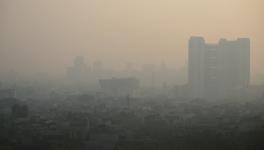To What Extent can Air Filters Help in Cleaning Viral Particles? New Study Shows Positive Results
Representational use only.
Respiratory viruses are primarily transmitted through the air, and so is the case with the SARS-CoV-2, the coronavirus causing COVID-19 disease. It has now been accepted that the coronavirus is an airborne virus, and it transmits not only through large droplets falling on surfaces but also via air particles. With this knowledge, researchers have been looking into the possibility of using air filters, which can effectively filter the viral particles off from a closed space.
A recent study published in the preprint server medRXiv provides some positive results in this regard. In the study, a team of researchers from Cambridge University analysed the utility of portable air filters at a hospital full of COVID-19 patients. The study claims that portable air filters can effectively remove SARS-CoV-2 particles from the air. Experts claim that this is the first study on air filters in a real-world setting.
Despite having full protective measures like the PPE (Personal Protective Equipment) kit, hospitals worldwide have reported substantial coronavirus transmission to health care workers engaged in the treatment of COVID-19 patients.
There have been earlier attempts to assess the performance of air filters, especially to look at the removal of inactive particles in controlled environments. The controlled environments chosen for such studies don’t reflect the real-world situation. Hence, it was unclear how effective the air filters could be in removing viral particles when used in an ICU (Intensive Care Unit) or hospital general ward.
Vilas Navapurkar, a co-author of the study and an ICU physician at Cambridge, UK, was quoted to have commented, "Hospitals have turned to portable air filters as an attractive solution when their isolation facilities are full. But it’s important to know whether such filters are effective or whether they provide a false sense of security."
To assess how the air filters face the real-world situation, Navapurkar and his team installed them in two fully occupied COVID-19 wards— a general ward and an ICU. The researchers chose HEPA (High-Efficiency Particulate Air) filters combined with a UV steriliser. These filters pass air through a fine mesh that can catch microscopic particles.
Apprehensions regarding the HEPA filters have been in place, with some experts believing that the HEPA cannot catch a particle of size lesser than 0.3 microns. Hence, they were deemed ineffective in filtering airborne coronavirus particles. However, studies show that SARS-CoV-2 is approximately 0.125 microns in its diameter. The HEPA filters have a capacity of filtering particles of size 0.01 micron. So, the coronavirus comes squarely within the capacity of the HEPA filters.
Navapurkar and his co-researchers collected air samples from the general and the ICU wards during a week when the air filters and steriliser combo were on and two weeks when the filters were off.
They found different results in general and in the ICU wards. When the filter and steriliser were off in the general ward, they found coronavirus particles in the air. In contrast, they did not find the viral particles when the filter and steriliser were on. On the other hand, the ICU ward didn't have a significant amount of viral particles even when the filters were off. The authors have interpreted the differential results in general and in the ICU ward with several suggestions, including slower viral replication at the later stages of the disease.
The authors also suggest that applying measures of removing the virus from the general ward may be of more importance than the ICU ward. However, the researchers also found that the filter and steriliser combo is not just effective against the coronavirus but also against detectable amounts of other pathogens like E.Coli, Staphylococcus aureus (both are bacteria), which were effectively removed.
Get the latest reports & analysis with people's perspective on Protests, movements & deep analytical videos, discussions of the current affairs in your Telegram app. Subscribe to NewsClick's Telegram channel & get Real-Time updates on stories, as they get published on our website.
























